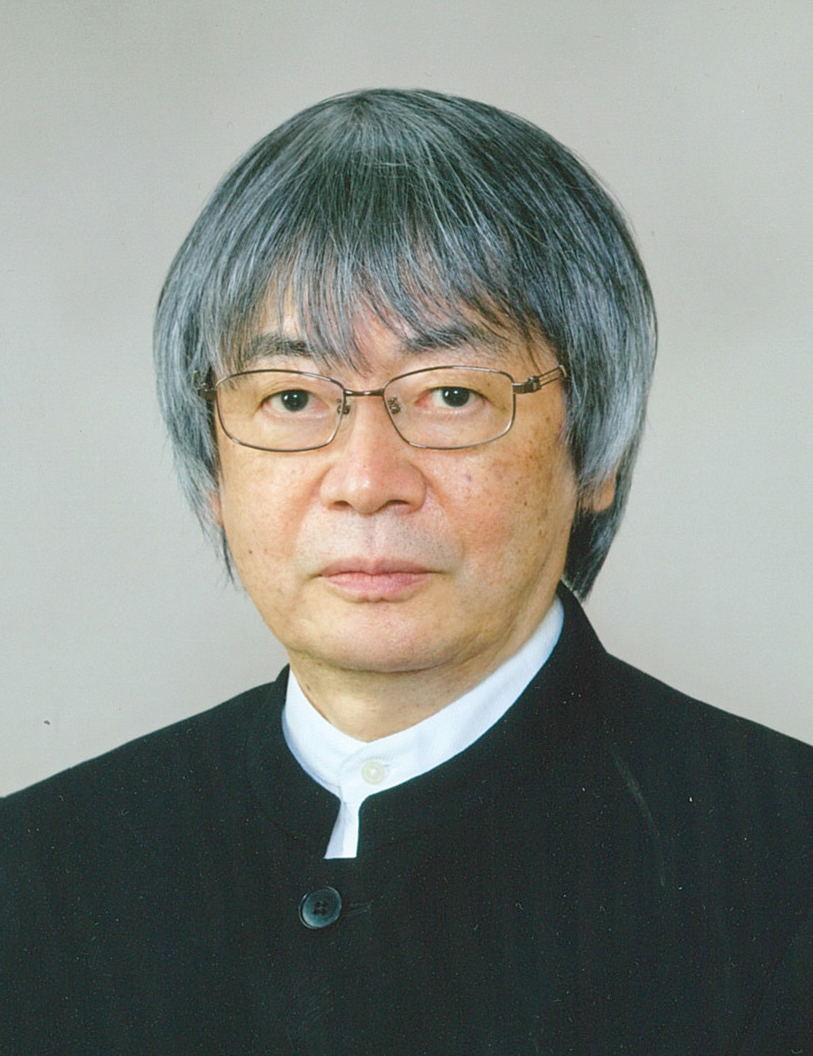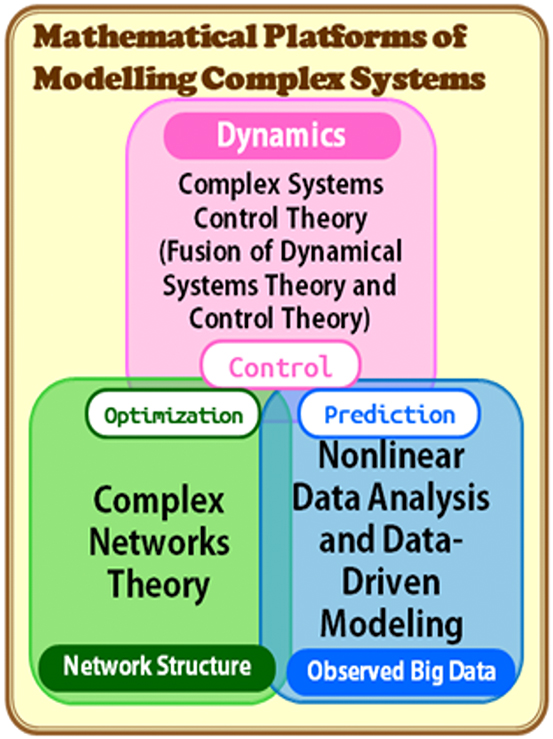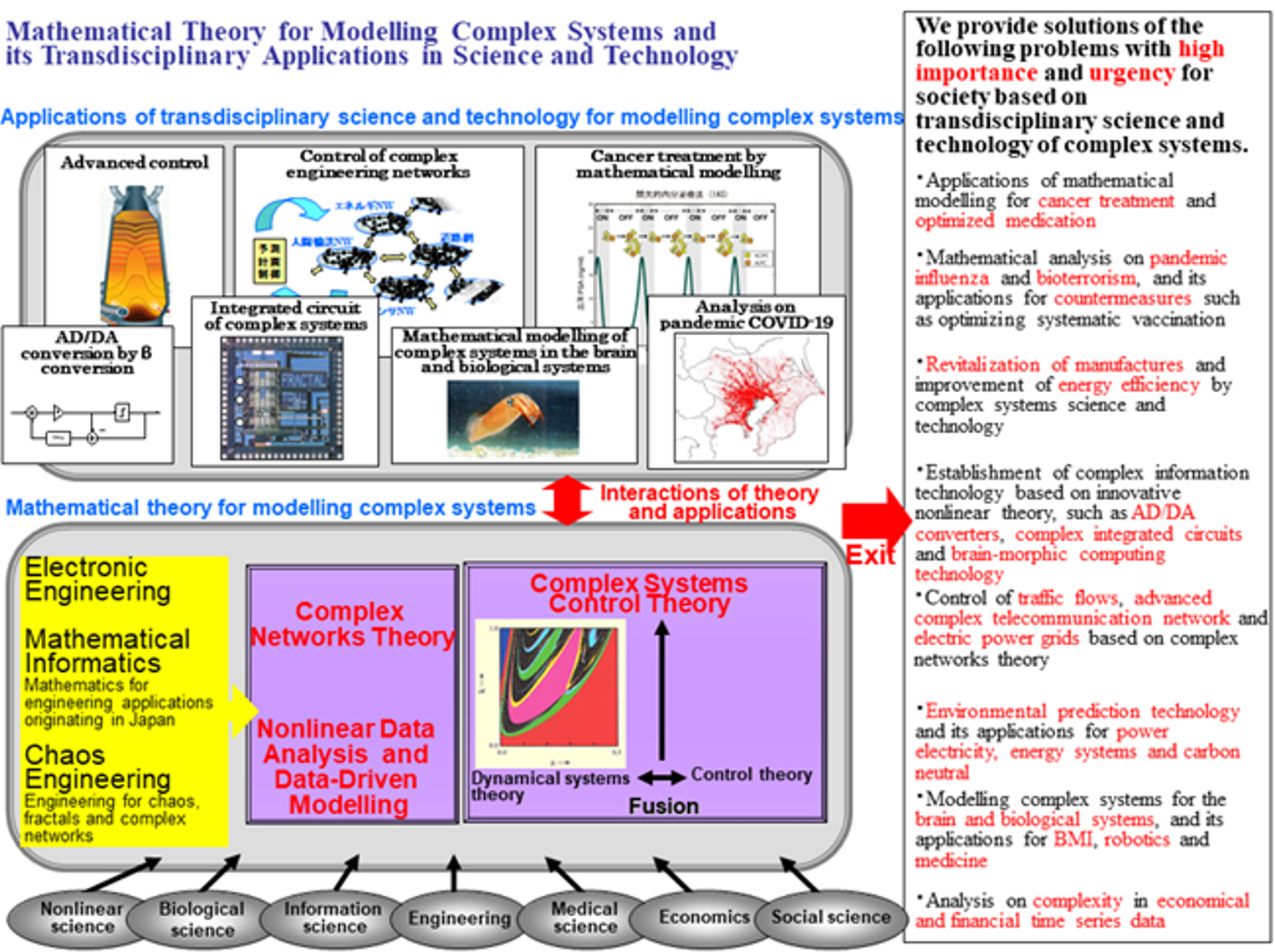Achievement Award
Pioneering Research on the Fundamental Theory for Mathematical Modelling of Complex Systems and its Applications

Many important targets of research in the 21st century such as the brain, life, diseases including cancer, immunity, health, infectious disease epidemics & pandemics, energy & electric power systems, environmental problems including carbon neutrality, communications, traffic, economy & finance, earthquakes, and security & safety can be analyzed as complex systems in a wide sense, the study of which needs a multidisciplinary approach [1].
The awardee, Professor Kazuyuki AIHARA has been engaging in pioneering research on fundamental theory for the mathematical modeling of complex systems and its applications in order to mathematically analyze, optimize, control, and predict such real-world complex systems on the basis of electronic engineering, mathematical informatics, and chaos engineering on engineering studies of chaos, fractal, and complex networks which the awardee was the first in the world to advocate [2]. In particular, through such research projects as Aihara Complexity Modelling Project, ERATO (The Exploratory Research for Advanced Technology)by JST (Japan Science and Technology Agency), Aihara Innovative Mathematical Modelling Project “Mathematical Theory for Modelling Complex Systems and its Transdisciplinary Applications in Science and Technology”, FIRST (Funding Program for World-Leading Innovative R&D on Science and Technology) by the Cabinet Office of Japan and JSPS (Japan Society for the Promotion of Science), Aihara Moonshot Project ”Comprehensive Mathematical Understanding of the Complex Control System between Organs and Challenge for Ultra-Early Precision Medicine,” Moonshot Research and Development Program by the Cabinet Office of Japan and JST, the awardee has constructed fundamental theory for the mathematical modelling of complex systems composed of (1) complex systems control theory based on a fusion of dynamical systems theory and control theory for the control of complex systems with hierarchical feedback dynamics between the microscopic and macroscopic levels, (2) complex networks theory for optimization through complex network structure, and (3) nonlinear data analysis and data-driven modelling for prediction and mathematical modelling of big data observed from complex systems (see Figure 1) [1],[3]. The awardee also developed many real-world applications based on fundamental theory of mathematical modelling complex systems as summarized in Figure2 [1]-[7], thus showing the importance of the mathematical modelling of complex systems not only for basic science but also for practical sciences like engineering and medicine including electronics, information and communication engineering.


Recently, as deputy director of International Research Center for Neurointelligence, Institute for Advanced Study, The University of Tokyo, the awardee has been studying possible mechanisms of the emergence of human intelligence and critical periods during which learning ability and plasticity are greatly enhanced as well as next generation neuro-inspired artificial intelligence [8],[9] by combining electronics and mathematical informatics with experimental and clinical brain science. Further, as project manager of the ongoing Aihara Moonshot project, the awardee is developing fundamental theory to realize ultra-early precision medicine for different diseases like mental and neurological diseases, diabetes, cancer and so on in collaboration with researchers in basic medical science and clinical medicine. In particular, the Dynamical Network Biomarkers DNB which the awardee et al. proposed are now applied to many diseases and greatly contribute to progress in the scientific study of pre-symptom diseases, or so-called Mibyo [10]. Moreover, the generalization of DNB, namely Dynamical Network Markers DNM are expected to be applied for detecting early warning signals of state transitions in many complex systems.
As described above, the awardee's achievements are remarkable and well deserving of the Society's Achievement Award.
References
- K. Aihara (Ed.): “Astonishing Mathematical Engineering to Change Livelihoods (in Japanese),” Wedge (2015.5).
- K. Aihara: “Chaos Engineering and its Application to Parallel Distributed Processing with Chaotic Neural Networks,” Proceedings of the IEEE, Vol.90, No.5, pp.919-930 (2002.5).
- K. Aihara, J. Imura, and T. Ueta (Eds.): “Analysis and Control of Complex Dynamical Systems: Robust Bifurcation, Dynamic Attractors, and Network Complexity,” Springer (2015.3).
- K. Aihara and R. Kanzaki (Eds.): “Introduction of Brain Science from a Viewpoint of Science and Engineering (in Japanese),” University of Tokyo Press (2008.8).
- K. Aihara (Ed.): “How to Develop Artificial Intelligence (in Japanese),” Wedge (2017.9).
- K. Sakai (Ed.), K. Aihara, M. Zushi, Y. Tsuruoka, Y. Habu, and N. Fukui: “The Brain and AI (in Japanese),” Chuokoron-Shinsha (2022.1).
- H. Nishiura (Ed.), T. Kobayashi, A. Anzai, K. Aihara and N. Linton: “Mathematical Modelling of Infectious Disease Epidemics (in Japanese),” Nippon Hyoron Sha (2022.7).
- T. Kohno and K. Aihara: “A MOSFET-based model on a Class-2 type of Nerve Membrane,” IEEE Transactions on Neural Networks, Vol.16, No.3, pp.754-773 (2005.5).
- T. Inagaki, et al.: “Collective and Synchronous Dynamics of Photonic Spiking Neurons,” Nature Communications, Vol.12, Article No.2325, pp.1-8 (2021.4).
- K. Koizumi, et al.: “Identifying Pre-disease Signals before Metabolic Syndrome in Mice by Dynamical Network Biomarkers,” Scientific Reports, Vol.9, Article No.8767, pp.1-11 (2019.6).